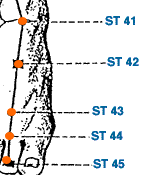ST 42
Acupuncture Point Theory
ST 42 Acupuncture Point Applications and Theory
 The acupuncture point "ST 42" , 沖陽, is represented by "Chongyang" in pinyin and "Surging Yang" in english and may be found:
The acupuncture point "ST 42" , 沖陽, is represented by "Chongyang" in pinyin and "Surging Yang" in english and may be found:
Between the 2nd and 3rd metatarsals and the cuneiform bone, between the tendons of the long extensor muscles of the big toe and other toes.
Of many possible clinical applications, it may be considered to influence the following issues/symptoms:
- Issues on the upper end of the channel (i.e. mouth/face/head) - upper mouth/teeth issues, toothache, deviation of the face as in bell's palsy or stroke.
- Local point for foot pain - pain, swelling, redness - also motor control issues of the foot.
ST 42 has some precautions to be considered (see our precautions list).
Avoid Artery (AA)
St 42 has the following theoretical associations which serve as important guideposts in designing an effective treatment protocol:
- Yuan Source Point
Explore st 42 functional groupings theory - Entry Exit Point, Shokanten - Nine Continent and/or YuanLuo, or read all point categories and related theory.
A single acupuncture point is not commonly thought of as an empirical way to influence a TCM diagnostic pattern. ST42, however, is a strong candidate to be incorporated into an acupuncture protocol for patients who exhibit: Liver Wind
ST 42 may potentially be used, in coordination with a well designed acupuncture treatment protocol, to influence the following conditions: Ankle Pain, Bells Palsy, Multiple Sclerosis (MS), Parkinson's Disease (PD), Stroke (CVA) and/or Toothache
While not necessarily valid clinically, GB 41 (Moves LV Qi - menstrual/breast disorders, distal …), KD 2 (Generally useful for clearing excesses & acut…) and SP 4 (Excess pathologies of the ST and Intestines - sev…) are nearby.
All Content 1999-2025
Chad J. Dupuis / Yin Yang House
Our Policies and Privacy Guidelines
Our Affiliated Clinics
